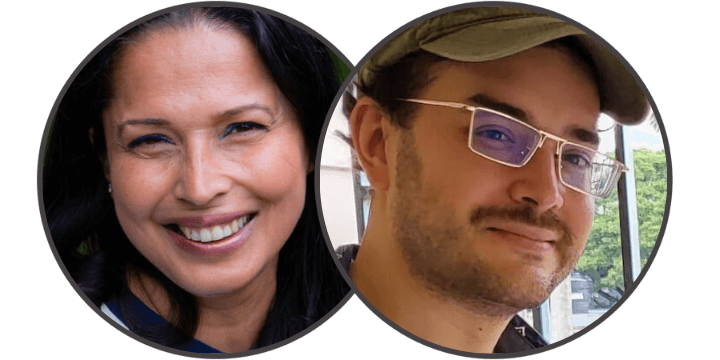Esalen Institute is open! However, Highway 1 to the south is closed — please review the alternate route directions.




Please note: On Wednesday September 20, online registration may be unavailable for up to 15 minutes while system maintenance is performed. If the 'Register Now' page does not load, please wait about 15 minutes and try again.
Have you ever wondered if your own mind and body hold the key to unlocking a path to transformation? Today the word “Tantra” has an incredible array of culturally specific meanings in South Asia and around the world, ranging from the exploration of anything strange to the carrying out of a guru’s instructions, and, yes, the word also applies to sexual practices.
One overarching meaning that encompasses all is this: Tantra, an applied method of acquiring freedom from external interference and of obtaining self-sovereignty (Sanskrit: svādhikāra) along this very path to transformation.
Join Tantric scholar-practitioners Sravana Borkataky-Varma and Keith Cantú for this fascinating signature series to explore the foundations of Tantric theory and practice. Together, we will immerse ourselves in the latest findings from academic research and ethnographic “participant observation” that challenge and reframe our conventional understandings of what Tantra was, is, and can be. Staying true to the roots of Esalen, we will intertwine the research and discussion with authentic Indian folk music performances and guided meditations to bring these new understandings creatively to life in your mind, body, and heart. Our collective practice of these new understandings will illuminate Tantra’s connections to a wide variety of vibrant artistic and meditative practices in an eye-opening and unforgettable way.
In this workshop, you’ll be invited to:
We invite you to join us for this series of workshops that will blend meditation, art, and music with a holistic inquiry into Tantra’s power and therapeutic potential. Bring an open mind as we explore deep questions about our bodies and minds in a safe space and nurturing environment.
Recommended reading: Chapter One of The Hindu Tantric World by André Padoux
Learn more about the requirements to receive continuing education credit.
Sravana Borkataky-Varma, PhD, is a historian, educator, and social entrepreneur. As a historian, she studies Indian religions focusing on esoteric rituals and gender, particularly in Hindu Śākta (Goddess) Tantra traditions. As an educator, she is an instructional assistant professor at the University of Houston. At present, she is a Center for the Study of World Religions fellow at Harvard Divinity School, Harvard University.
Read More
Keith Edward Cantú is an academic, musician, and polyglot with a deep professional and personal interest in South Asian religion and spirituality. He has extensively researched and directly engaged Baul Fakiri, Tamil Śaiva, and other tantric currents over the course of eleven years, and also has a personal and professional interest in esotericism more broadly.
Read More
Have you ever wondered if your own mind and body hold the key to unlocking a path to transformation? Today the word “Tantra” has an incredible array of culturally specific meanings in South Asia and around the world, ranging from the exploration of anything strange to the carrying out of a guru’s instructions, and, yes, the word also applies to sexual practices.
One overarching meaning that encompasses all is this: Tantra, an applied method of acquiring freedom from external interference and of obtaining self-sovereignty (Sanskrit: svādhikāra) along this very path to transformation.
Join Tantric scholar-practitioners Sravana Borkataky-Varma and Keith Cantú for this fascinating signature series to explore the foundations of Tantric theory and practice. Together, we will immerse ourselves in the latest findings from academic research and ethnographic “participant observation” that challenge and reframe our conventional understandings of what Tantra was, is, and can be. Staying true to the roots of Esalen, we will intertwine the research and discussion with authentic Indian folk music performances and guided meditations to bring these new understandings creatively to life in your mind, body, and heart. Our collective practice of these new understandings will illuminate Tantra’s connections to a wide variety of vibrant artistic and meditative practices in an eye-opening and unforgettable way.
In this workshop, you’ll be invited to:
We invite you to join us for this series of workshops that will blend meditation, art, and music with a holistic inquiry into Tantra’s power and therapeutic potential. Bring an open mind as we explore deep questions about our bodies and minds in a safe space and nurturing environment.
Recommended reading: Chapter One of The Hindu Tantric World by André Padoux
Learn more about the requirements to receive continuing education credit.
Sravana Borkataky-Varma, PhD, is a historian, educator, and social entrepreneur. As a historian, she studies Indian religions focusing on esoteric rituals and gender, particularly in Hindu Śākta (Goddess) Tantra traditions. As an educator, she is an instructional assistant professor at the University of Houston. At present, she is a Center for the Study of World Religions fellow at Harvard Divinity School, Harvard University.
Keith Edward Cantú is an academic, musician, and polyglot with a deep professional and personal interest in South Asian religion and spirituality. He has extensively researched and directly engaged Baul Fakiri, Tamil Śaiva, and other tantric currents over the course of eleven years, and also has a personal and professional interest in esotericism more broadly.

February 17–20, 2023
This program is full. Find another.
Applications are closed.
Applications are closed.
Have you ever wondered if your own mind and body hold the key to unlocking a path to transformation? Today the word “Tantra” has an incredible array of culturally specific meanings in South Asia and around the world, ranging from the exploration of anything strange to the carrying out of a guru’s instructions, and, yes, the word also applies to sexual practices.
One overarching meaning that encompasses all is this: Tantra, an applied method of acquiring freedom from external interference and of obtaining self-sovereignty (Sanskrit: svādhikāra) along this very path to transformation.
Join Tantric scholar-practitioners Sravana Borkataky-Varma and Keith Cantú for this fascinating signature series to explore the foundations of Tantric theory and practice. Together, we will immerse ourselves in the latest findings from academic research and ethnographic “participant observation” that challenge and reframe our conventional understandings of what Tantra was, is, and can be. Staying true to the roots of Esalen, we will intertwine the research and discussion with authentic Indian folk music performances and guided meditations to bring these new understandings creatively to life in your mind, body, and heart. Our collective practice of these new understandings will illuminate Tantra’s connections to a wide variety of vibrant artistic and meditative practices in an eye-opening and unforgettable way.
In this workshop, you’ll be invited to:
We invite you to join us for this series of workshops that will blend meditation, art, and music with a holistic inquiry into Tantra’s power and therapeutic potential. Bring an open mind as we explore deep questions about our bodies and minds in a safe space and nurturing environment.
Recommended reading: Chapter One of The Hindu Tantric World by André Padoux
Learn more about the requirements to receive continuing education credit.
Sravana Borkataky-Varma, PhD, is a historian, educator, and social entrepreneur. As a historian, she studies Indian religions focusing on esoteric rituals and gender, particularly in Hindu Śākta (Goddess) Tantra traditions. As an educator, she is an instructional assistant professor at the University of Houston. At present, she is a Center for the Study of World Religions fellow at Harvard Divinity School, Harvard University.
Keith Edward Cantú is an academic, musician, and polyglot with a deep professional and personal interest in South Asian religion and spirituality. He has extensively researched and directly engaged Baul Fakiri, Tamil Śaiva, and other tantric currents over the course of eleven years, and also has a personal and professional interest in esotericism more broadly.